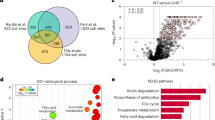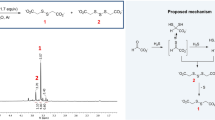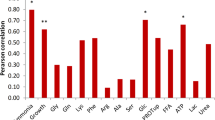Abstract
IN 1939, it was suggested by one of us1 that the amide-nitrogen of glutamine was a source of urea-nitrogen and that urea formation was paralleled by a continuous re-synthesis of glutamine. Evidence has now been obtained for a reaction between bicarbonate (as the source of urea-carbon) and the two nitrogenous groups of glutamine. This appears to represent the first of the sequence of reactions leading to urea synthesis. The evidence for this step is based on the observation that when liver slices are incubated with glutamine in absence of added bicarbonate, not only was urea synthesis practically suppressed but also neither the glutamine-amide-nitrogen nor the amino-nitrogen of glutamine was utilized to any extent. On the other hand, in the presence of bicarbonate a considerable synthesis of urea occurred with the simultaneous utilization of amide-nitrogen and of amino-nitrogen (Table 1). The small quantities of ammonia derived from glutamine and formed during the incubation were unaffected by bicarbonate and therefore appear to be unrelated to urea synthesis. That glutamine rather than ammonia or ammonium glutamate acted as a direct source of urea-nitrogen was demonstrated in several ways: first, by the fact that the rate of urea synthesis from glutamine was directly proportional to the substrate concentration, whereas this was not so when ammonia served as a substrate (Fig. 1). A slight inhibitory effect of ammonia was observed at the highest concentrations tested. Secondly, inhibition of glutam-inase by sulphophthaleins had no effect on the synthesis, whereas activation of glutaminase with pyruvate almost completely inhibited urea formation. Finally, evidence was obtained by paper chromatography for a considerable formation of glutamine from ammonium salts in liver slices. These observations provide evidence for the role of glutamine, as distinct from ammonium glutamate, in urea synthesis and suggest that urea formation from ammonia may depend upon a transitory formation of glutamine.
This is a preview of subscription content, access via your institution
Access options
Subscribe to this journal
Receive 51 print issues and online access
$199.00 per year
only $3.90 per issue
Buy this article
- Purchase on Springer Link
- Instant access to full article PDF
Prices may be subject to local taxes which are calculated during checkout
Similar content being viewed by others
References
Bach, S. J., Biochem. J., 33, 1833 (1939).
Krebs, H. A., and Henseleit, K., Hoppe-Seyl. Z., 210, 33 (1932).
Cohen, P. P., and Hayano, M., J. Biol. Chem., 172, 405 (1948). Cohen, P. P., and Grisolia, S., J. Biol. Chem., 182, 747 (1950).
Abrams, A., and Borsook, H., J. Biol. Chem., 198, 205 (1952). Uchida, M., Itagaki, S., and Wachi, T., Amer. Chem. Abstr., 46, 9637 (1952).
Tesar, C., and Rittenberg, D., J. Biol. Chem., 170, 35 (1947).
Author information
Authors and Affiliations
Rights and permissions
About this article
Cite this article
BACH, S., SMITH, M. Role of Glutamine in Urea Synthesis. Nature 176, 1126–1127 (1955). https://doi.org/10.1038/1761126a0
Issue Date:
DOI: https://doi.org/10.1038/1761126a0
This article is cited by
-
�ber den Einflu� von Cystinf�tterung auf Gewebs-Aminos�uren und ?-Aminostickstoff im Nierenblut
Zeitschrift f�r Kinderheilkunde (1958)
Comments
By submitting a comment you agree to abide by our Terms and Community Guidelines. If you find something abusive or that does not comply with our terms or guidelines please flag it as inappropriate.



